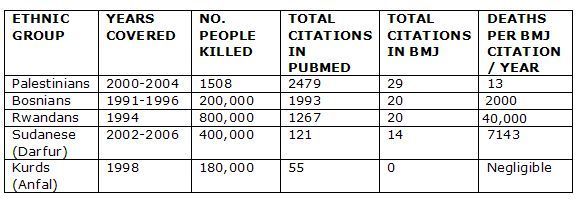 Following the British Medical Journal’s attack on HonestReporting, many people, including Melanie Phillips ask: “what have the Arab/Israel impasse and Israel’s military strategy towards the Palestinians got to do with the practice of medicine?”
Following the British Medical Journal’s attack on HonestReporting, many people, including Melanie Phillips ask: “what have the Arab/Israel impasse and Israel’s military strategy towards the Palestinians got to do with the practice of medicine?”
Indeed, the BMJ has gone way beyond its own mission statement:
To lead the debate on health, and to engage, inform, and stimulate doctors, researchers and other health professionals in ways that will improve outcomes for patients.
To achieve these aims we publish original scientific studies, review and educational articles, and papers commenting on the clinical, scientific, social, political, and economic factors affecting health.
Karl Sabbagh, whose analysis of e-mails to the BMJ from 2004 provided the “evidence” necessary to accuse HonestReporting of attempting to stifle debate and freedom of speech, is certainly no medical professional. It is difficult to imagine that his analysis would conform to the high standards of oversight and scientific scrutiny necessary to be published in a renowned medical journal. His article and the accompanying pieces also clearly have very little to do with “factors affecting health.”
While the BMJ decided to involve itself with a politicized and subjective issue using commentators from outside the medical field, HonestReporting asked an actual physician to conduct our own brief overview of the BMJ’s selectivity using an arguably more reliable methodology than that employed by Sabbagh in his own study.
PubMed is is a service of the U.S. National Library of Medicine that includes over 18 million citations from various life science journals for biomedical articles back to 1948 – the medical version of Google. Dr. Simon Fishman entered searches for citations relating to victims of international conflicts, including Palestinians.
Such a search reveals articles in medical journals examining a whole range of genuine healthcare issues such as the psychological effects of war on Rwandan, Bosnian and Darfurian children, HIV testing in Rwanda, and other studies that are not necessarily focused on death tolls from such conflicts. Nonetheless, using the casualty figures from a range of conflict zones as a simple judge of scale produced the following results:

-
When Europeans kill Europeans (Bosnia), the BMJ allocates one citation for every 2000 deaths.
-
When Africans kill Africans (Rwanda), the BMJ allocates one citation for every 4000 deaths.
-
When Muslim Arabs kill Black Africans (Darfur), the BMJ allocates one citation for every (minimum) 7000 Dafurians who are killed.
-
When Israelis, in the process of combating terrorists, kill Palestinians, the BMJ allocates one citation for every 13 Palestinians killed (including terrorist combatants).
-
When Arab Muslims kill Kurds, the BMJ fails to give this any attention whatsoever.
The evidence clearly shows that the BMJ has a disproportionate interest in Palestinian deaths over those from other conflict areas where the impact on public health is certainly as great and potentially greater than that of the Israeli-Palestinian conflict. This bias is consistent with its attacks on the so-called “Israel lobby.” If the journal maintained editorial balance, it would be less vulnerable to criticism on the issue and would have less reason to resort to conspiracy theories to deflect legitimate criticism.
So what is behind the BMJ’s unhealthy focus on the “Israel lobby”? These findings would suggest that the supposed campaign to silence the BMJ has failed. Not a surprise as, contrary to the BMJ’s claims, such a campaign never existed.
If you are a certified medical professional, please contact the BMJ and, if you are a member, the British Medical Association, to ask why the BMJ is promoting such a biased and politicized editorial policy. (The BMJ is published by BMJ Publishing Group Ltd, a wholly owned subsidiary of the British Medical Association.)
SKY’S “ETHNIC CLEANSING”
Headlines are extremely important as they set the basis for the whole story, are the first thing the reader sees and the last message left in the reader’s mind. Including inflammatory terminology in a headline can create an explosive mix.
Sky News features a story of illegally built Palestinian homes in eastern Jerusalem under threat of demolition to make way for an archaeological park. Somewhat predictably, Palestinians accuse Israel of “ethnic cleansing”, a particularly emotive and demonizing use of language. One is entitled to agree or disagree with the policies of the Jerusalem Municipality in this case. However, Sky News should not be including this terminology without attribution in its headline:
 While Sky News may claim that the inclusion of the word “Fears” in the headline is enough to imply that the headline is not directly accusing Israel of “Ethnic Cleansing”, it is nonetheless clear where the headline is directing the reader. At a minimum, the term should have been placed within quotation marks to demonstrate attribution to another source.
While Sky News may claim that the inclusion of the word “Fears” in the headline is enough to imply that the headline is not directly accusing Israel of “Ethnic Cleansing”, it is nonetheless clear where the headline is directing the reader. At a minimum, the term should have been placed within quotation marks to demonstrate attribution to another source.
In stark contrast to Sky, the Associated Press reports on the same story using a far more neutral headline: “Arab homes on Jewish historical site stoke strife”.

